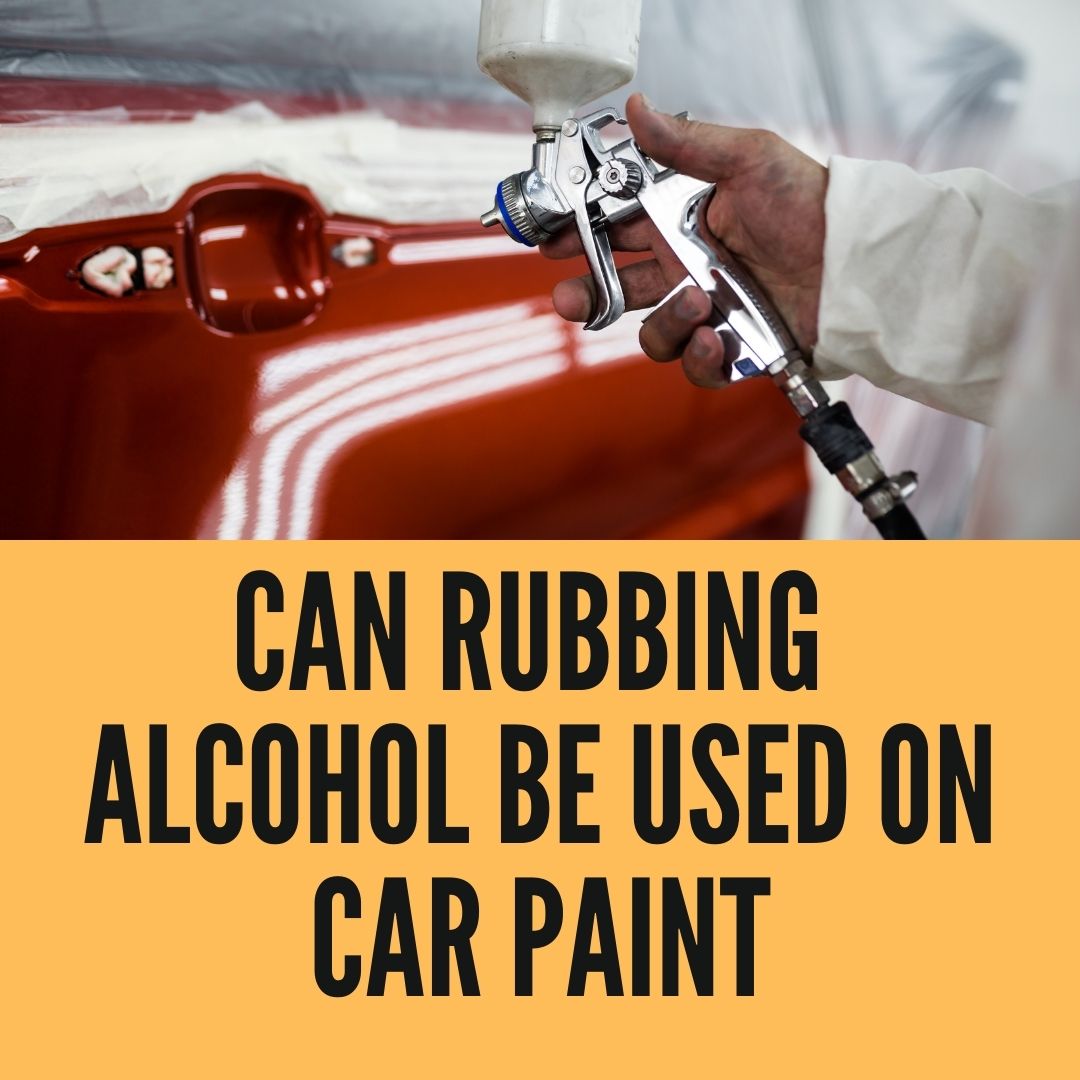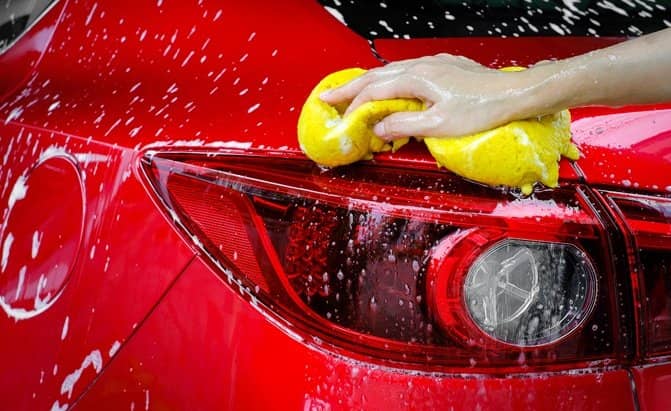
If you’ve ever had your car professionally detailed, polished, or otherwise cleaned, then you may have noticed that the person detailing your car had a spray bottle full of isopropyl rubbing alcohol.
It may seem a bit strange considering there are so many other, more expensive solvents and cleaners on the market. However, many experienced details swear by their good old-fashioned rubbing alcohol.
So can rubbing alcohol be used on car paint? Rubbing alcohol can be used on car paint. Rubbing alcohol is an excellent cleaning agent to remove grease, oil, and heavy soiling from car paint. Rubbing alcohol is also a very important agent used to prepare vehicle surfaces for fresh paint, vehicle wraps, tint, and more. Rubbing Alcohol can also be used to remove old layers of wax or sealant from car paint.
Although rubbing alcohol is commonly used, there are some safety precautions and procedures that you need to take into account before you spray down your car.
If used improperly, you could stand to damage your paint or cause other unwanted problems.
So will rubbing alcohol damage car paint? Rubbing alcohol will not damage car paint. Rubbing alcohol can be safely used on car paint if it is diluted to between 10% and 15%.
Keep on reading to learn exactly how to use rubbing alcohol on your car’s paint.

Using Rubbing Alcohol To Detail Your Car
Rubbing alcohol has a wide variety of applications when it comes to car detailing.
The most common application of rubbing alcohol when it comes to cars is to clean the rims. As you drive around, your wheels are constantly exposed to dirt, grease, grime, mud, and brake dust. As you can imagine, all of these things can make even the shiniest of rims look like a pair of old work boots.
A lot of the filth picked up by your car wheels and sprayed on your fenders is thick and won’t come off with regular soap and water- no matter how hard you scrub.
There are a variety of other solvents such as Purple Power or Simple Green, but these products are often expensive, bad for the environment (storm drains), and can damage your paint if you don’t use them the right way.
Isopropyl alcohol does an excellent job of removing all of that hard-to-clean grease and evaporates immediately so it’s not an environmental hazard! It’s also safe to work with and won’t damage your hands the way that stronger industrial solvents can.
If your car has leftover residue from bumper stickers or dealership tags, a bit of alcohol is often all that it takes to break down the final adhesive bond. You may have to apply rubbing alcohol multiple times and let it soak, but at least you won’t have to resort to scraping it off and damaging your paint job.
Apart from everyday cleaning, rubbing alcohol is commonly used to remove old layers of wax or paint sealant. Wax is applied to keep your paint protected and to facilitate water run-off.
However, this old wax layer will need to be removed before getting your paint polished, dents, repaired, or scratches filled in.
If you’re tinting your windows, adding a protective film, or getting your car wrapped, alcohol is one of the most important steps of the preparation process.
Before applying tint film and wraps, you need to make sure that the surface under them is 100% clean. Even the smallest piece of dirt or grime stuck between your paint and the film can ruin the final appearance.
The alcohol also makes the surface just wet enough for the film to stick to while you smooth it out and before you use the heat gun to bind the material to the glass or paint.
As a side note, if your car ever develops a musty smell or mold, spraying it down with 70% isopropyl alcohol is an excellent way to kill the mold and prevent it from spreading any further!
Will Rubbing Alcohol Damage My Vehicle’s Clear Coat?
All cars have a thin layer of transparent clear coat that’s applied on top of the paint.
This coat ensures that the real paint is protected from the elements and isn’t easily scratched by road dust.
It helps the paint retain its vibrant color and prevents UV damage from sun exposure (a major problem for those without indoor garages).
One of the first concerns that come to mind when applying isopropyl rubbing alcohol to car paint is that it might damage the clearcoat. Since the clear coat is considerably softer than the paint underneath and alcohol is a dissolving agent, this is a valid concern.
If you were to apply large amounts of rubbing alcohol to the paint surface and let it soak for a considerable amount of time, then it could certainly wear down your clear coat.
However, since alcohol evaporates so quickly, it usually doesn’t have time to do any significant damage to the clear coat.
Just make sure that the alcohol doesn’t spend a lot of time soaking or sitting on the surface. Some car owners may do this accidentally by leaving a wet rag soaked in alcohol on top of their hood.
Here are some other posts that might interest you:
Should I Dilute The Rubbing Alcohol?
When it comes to spraying it on your car’s paint, you should never spray full-strength isopropyl rubbing alcohol directly on the paint.
This is one of the easiest ways to dissolve your protective clear coat, damage your paint, and cause yourself hundreds of dollars in cosmetic repairs. Not to be overly dramatic, but I don’t want to be responsible for you messing up your brand-new car.
If you’re going to be using rubbing alcohol on your car’s paint, then you’ll want to dilute it to between 10% and 15%. We recommend erring on the side of 10% unless you have some really thick wax or grease that doesn’t come off with the lower concentration.
You’re not going to find alcohol that’s this diluted on store shelves. Instead, you’ll need to dilute it yourself with some water. Depending on the concentration of isopropyl alcohol that you have, you’ll need to do a bit of math to figure out how much water you need to add.
Here’s an easy mixture that you can do to achieve a moderate 12.5% concentration of alcohol in a bottle:
- Get a quart-sized container (32 ounces).
- Fill it a quarter of the way (8 ounces) with 50% strength rubbing alcohol.
- Fill it the rest of the way up with water.
This lower-concentrated mixture should be perfectly safe to use on your car’s paint without damaging it!

My name is Logan, and I’m a 36-year-old dad who owns a small pressure-washing company in the suburbs of Atlanta, Georgia. My main goal with rubbing-alcohol.com is to show you how versatile isopropyl rubbing alcohol can be! I hope. You find it useful.
